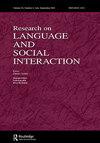追求共同点:普通话会话中的非否定性修辞问题
IF 2.1
1区 文学
Q1 COMMUNICATION
引用次数: 1
摘要
修辞问题经常被观察到在诸如挑战、抱怨或反驳之类的对话中实施否定行为。然而,本文报道了基于普通话中特定结构的反问句的非附属使用,该结构可以作为常规反问句、非附属反问句或非附属反诘句。尽管研究较少,但非从属使用在对话中的频率要高得多。本研究将语篇功能语言学和会话分析相结合,认为非附属的布什马反问是为了追求共同点,从而推动正在进行的活动。此外,它还考察了它们反复产生的顺序语境,并确定了相互作用的线索——认知的、顺序的、韵律的——这些线索使这些修辞问题被认为是在寻求共同点。这篇文章有助于我们理解反问句作为一种语法手段,它最大限度地提高了会话中的主体间性,进一步证实了语法和社会互动之间的相互影响。数据为中文,并有英文翻译。本文章由计算机程序翻译,如有差异,请以英文原文为准。
Pursuing Common Ground: Nondisaffiliative Rhetorical Questions in Mandarin Conversations
ABSTRACT Rhetorical questions have been regularly observed to implement disaffiliative actions in conversations such as challenging, complaining, or retorting. This article, however, reports on nondisaffiliative uses of rhetorical questions based on a particular structure in Mandarin, bushi … ma, which can serve as a conventional question, a disaffiliative rhetorical question, or a nondisaffiliative rhetorical question. Although much less studied, nondisaffiliative uses are by far more frequent in conversations. Integrating discourse-functional linguistics and conversation analysis, this study argues that nondisaffiliative bushi … ma rhetorical questions work to pursue common ground so as to move the activity-in-progress forward. Moreover, it examines the sequential contexts in which they are recurrently produced and identifies the interactional clues—epistemic, sequential, prosodic—that make these rhetorical questions recognizable as seeking common ground. This article contributes to our understanding of the rhetorical question as a grammatical device that maximizes intersubjectivity in conversation, further confirming the mutual influence between grammar and social interaction. Data are in Mandarin Chinese with English translation.
求助全文
通过发布文献求助,成功后即可免费获取论文全文。
去求助
来源期刊
CiteScore
7.30
自引率
7.40%
发文量
20
期刊介绍:
The journal publishes the highest quality empirical and theoretical research bearing on language as it is used in interaction. Researchers in communication, discourse analysis, conversation analysis, linguistic anthropology and ethnography are likely to be the most active contributors, but we welcome submission of articles from the broad range of interaction researchers. Published papers will normally involve the close analysis of naturally-occurring interaction. The journal is also open to theoretical essays, and to quantitative studies where these are tied closely to the results of naturalistic observation.

 求助内容:
求助内容: 应助结果提醒方式:
应助结果提醒方式:


